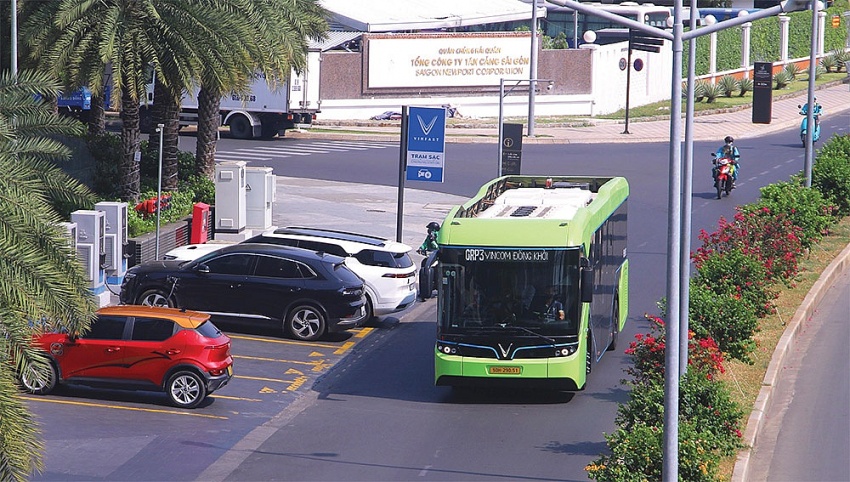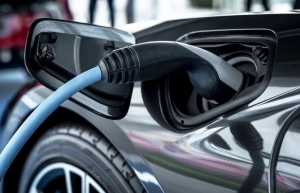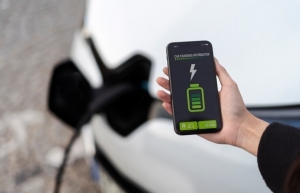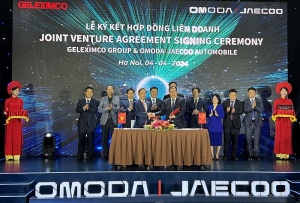Carmakers go it alone on e-vehicle charging solutions
 |
| Vietnam has grand long-term plans not only to make car use greener but also public transport such as buses Photo: Le Toan |
Carvivu, a local importer and distributor of electric vehicles (EVs), is planning to cooperate with domestic and foreign companies to develop charging stations, which are in high demand in Vietnam.
Sales director Dinh Quoc Dat told VIR, “When we sell the Haima EV, we provide customers with two AC home chargers and a wall charger with free installation. In addition, we give customers 18 months of free charging at unlimited distances at designated Carvivu stations.”
The company also provides packages for corporate customers and transport companies, and cooperates with them in the installation of charging infrastructure at their premises. “We are aware in advance about the challenges of charging stations in the early stage of EVs, so we decided to build plans for ourselves to serve our current operations as well as future expansion,” Dat added.
Charging infrastructure in Vietnam is still in the early stages of development, and current policies remain unclear. As a result, charging stations in the country are all funded by private companies or suppliers, with the majority owned by VinFast.
Carvivu is working with Chinese car manufacturers, including Haima, and is focused on a number of car models suitable for the Vietnamese market. In 2023, it launched the 7X and 7XE models, and is expected to introduce other lines in the near future.
Ho Hai An, general director of TMT Motors Electric, said that there are still difficulties due to unfavourable infrastructure.
“According to experience learnt from the Chinese market, about 80 per cent of customers mainly charge at home. This will be the main trend of EVs, and charging at home is a useful and convenient feature our offerings,” he explained.
Last year, TMT Motors opened up the small EV segment in Vietnam by launching the Wuling Mini EV, from a three-party joint venture of SAIC, GM, and Wuling.
“This model is equipped with a charger with a capacity of 1.5kW to help the vehicle charge as easily as charging a phone anywhere with a 220V civil power source,” An said. “It is not required to charge at a dedicated charging station like some other EVs. This model is aimed at users who travel daily with a distance of 120-170km. They just need to charge overnight and then are able to use a whole day.”
In the long term, he asked ministries and agencies to soon issue policies to promote EVs. “It is necessary to invest more in the development of EV charging infrastructure to meet more users’ needs. This is part of the government’s orientation to develop vehicles using clean energy in Vietnam,” An said.
The local market has, in recent times, witnessed the landing of EV brands, especially Chinese ones. A series of domestic automobile manufacturers and assemblers, as well as foreign car manufacturers such as Wuling, Haima, Zhidou, and others already moved to launch the first EVs in Vietnam.
In early April, the Vietnamese market welcomed the entrance of Chinese brands Omoda and Jaecoo when owner Chery entered a joint venture with Geleximco to build a factory here.
Complete vehicle imports are expected to be launched in the market at the end of 2024. Vu Van Tien, chairman of Geleximco, said that this joint venture plans to produce hybrid cars initially for the market, instead of focusing entirely on EVs.
“Hybrid cars will be very effective because Vietnam’s infrastructure cannot yet accommodate pure EVs,” Tien said. “In the coming years, when the infrastructure and technology become better with improved charging stations, we will research and produce pure EVs.”
Another Chinese carmaker, Guangzhou Automobile Group, plans to launch the AION Y Plus in June, marking its first EV to be sold in the Vietnamese market.
Like developed countries, Vietnam needs to encourage private organisations to contribute capital to increase charging stations on highways.
Wilmar Matinez, an electric energy research expert from the United Nations Development Programme, said that the number of vehicles in Vietnam using green energy is still quite low compared to those using fossil fuels. This is also the reason why electric charging stations on roads, especially highways, are not as popular as in other countries.
“Countries around the world, such as Germany and Norway, have also implemented financial and tax policies to encourage EV charging infrastructure, while introducing strict regulations in building charging infrastructure, standardising charging points, sources and charging speeds, as well as regulations on charging at public areas and at home,” he said.
Nguyen The Vinh, a specialist at state-run Vietnam Electricity, said that currently, the public charging station system accounts for 10 per cent of the country’s total electricity output.
“The number of charging stations is not the only problem. Increasing EV charging stations on highways also requires consideration of the number of EVs that need to be charged and the charging time at each station to avoid putting great pressure on the power system nationwide,” he cautioned.
 | VinFast sets sights on 100,000 EVs in 2024 VinFast, the Vietnamese electric vehicle (EV) manufacturer, has set an ambitious target of selling 100,000 EVs in 2024, following the announcement of its Q4/2023 financial statements in mid-February. This announcement was made by VinFast's chairwoman of the Board of Directors Le Thi Thu Thuy. |
 | Nissan, Honda explore partnership in electric vehicles Japanese arch-rivals Nissan and Honda said Friday they were exploring a strategic partnership in electric vehicles to face up to a "once-in-a-century" upheaval in the car industry. |
 | Hyundai to invest more than $50 bn in South Korea in major EV push Hyundai on Wednesday revealed plans to invest more than $50 billion in South Korea by 2026, with a huge chunk dedicated to boosting the development and production of electric vehicles. |
 | Geleximco Group and Chery International enter automobile joint venture Geleximco Group and Chery International on April 4 signed an agreement to set up a joint venture to build an automobile factory in Vietnam. |
What the stars mean:
★ Poor ★ ★ Promising ★★★ Good ★★★★ Very good ★★★★★ Exceptional
Related Contents
Latest News
More News
- Vietnam, New Zealand seek level-up in ties (February 19, 2026 | 18:06)
- Untapped potential in relations with Indonesia (February 19, 2026 | 17:56)
- German strengths match Vietnamese aspirations (February 19, 2026 | 17:40)
- Kim Long Motor and AOJ Suzhou enter strategic partnership (February 16, 2026 | 13:27)
- Haiphong welcomes long-term Euro investment (February 16, 2026 | 11:31)
- VIFC in Ho Chi Minh City officially launches (February 12, 2026 | 09:00)
- Norfund invests $4 million in Vietnam plastics recycling (February 11, 2026 | 11:51)
- Marico buys 75 per cent of Vietnam skincare startup Skinetiq (February 10, 2026 | 14:44)
- SCIC general director meets with Oman Investment Authority (February 10, 2026 | 14:14)
- G42 and Vietnamese consortium to build national AI infrastructure (February 09, 2026 | 17:32)

 Tag:
Tag:




















 Mobile Version
Mobile Version